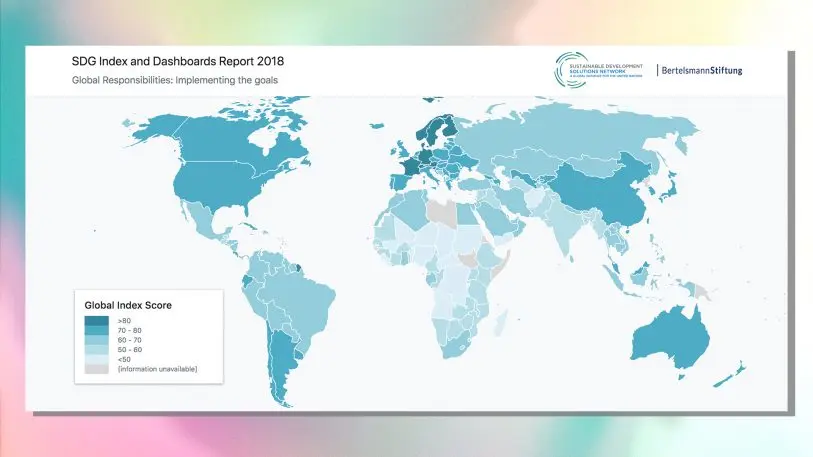You very likely do not need a comprehensive data set to tell you that by the measures of social fairness and sustainability, the world is not doing very well at all; you only need to open Twitter.
But as they have done every year since 2016, the Sustainable Development Solutions Network and the Bertelsmann Stiftung foundation have released their annual assessment of how 156 of the world’s largest countries are performing on the Sustainable Development Goals–the 17 U.N.-mandated targets, introduced in 2015, that each country should be striving to reach by 2030 to ensure against the premature collapse of our global systems and environment. The goals range from reducing poverty and hunger to promoting peace and responsible production and consumption of material goods, and the report grants each country an individual score for their performance on each goal, as well as an overall score out of 100.
In 2018, data on how countries are approaching these goals paints a pretty grim picture.
For the first time, the SDSN was able to aggregate enough present and historical data to determine trends in how countries are grappling with each one of the SDGs. While countries like Sweden, Denmark, and Finland top the list with scores in the 80s (as they generally do each year, along with global happiness rankings–a correlation that SDSN Director Jeffrey Sachs thinks is not without meaning), trends in the data show that they need to significantly accelerate progress if they’re going to achieve the targets for climate action and sustainable consumption and production by 2030. In other words, even countries that are doing well, are not doing well fast enough.

And then there’s the United States. Its score of 73 is not terrible, but it also shows some troubling trends. “While the U.S. is doing well if you look at the economy, we’re quite bad on social fairness and environmental sustainability,” Sachs says. “Trump is pointing us in an absolutely devastating direction because his whole policy mindset is even less fairness, more benefits for the rich, and an outright war on the environment. He basically represents short-term greed.”
But it would be a mistake, Sachs adds, to blame the U.S.’s poor performance on the SDGs on Trump. “The U.S. has been off-track for a long time,” Sachs says. For the past 30 or so years, he adds, the country has been operating under a political system that appeases corporations–many of them extractive fossil-fuel companies–over individuals. Compared to the Scandinavian countries at the top of the SDG rankings, the U.S.’s protections for vulnerable residents and the environment are all but nonexistent. In 1997, the country had an opportunity to implement the Kyoto Protocol, an earlier attempt to limit carbon emissions and keep climate change in check, but then-President Bill Clinton never passed the legislation onto Congress, knowing that the conservative Senate would refuse to approve it. Obama, while he signed onto the Paris Accord, faced stonewalling from his conservative Congress in passing many more progressive environmental and social protections.
Though past leaders may not have made too many gains in the areas under the SDGs purview, what’s alarming for Sachs is how actively Trump is working against even the moderate progress we have made. “We have a President who is saying we should drill in national parks and offshore, and has pulled us out of international agreements on climate,” Sachs says.
One of the features of the 2018 Bertelsmann Stiftung/SDSN report is that it measures, for the first time, the strength each of the 20 wealthiest countries’ implementation strategies for the goals. As Sachs writes in the report: “These transformations require strong government leadership working in partnership with business and civil society.” While some countries, like Italy and Mexico, have incorporated the SDGs into the highest levels of government, developing dedicated task forces for the goals and creating online engagement portals to track progress, the U.S. has slid backward: It is now one of the only wealthy countries in the world to have issued no formal statement endorsing the SDGs and calling for their implementation at the national level.
And that, to Sachs, encapsulates something far more troubling than the statistics in the report can capture. “One of the lessons is that when one of the most powerful countries in the world goes on attack of the principles of the SDGs–fairness and sustainability–you bring out terrible people all over,” Sachs says. The conservative government of the U.S. currently is one that prioritizes a select few, mostly white and wealthy, over the many. That ethos ramifies through both climate and social policy. A government that does not feel an obligation to take care of its people similarly does not feel the need to protect its environment and resources. With the U.S. still serving as a powerful political model for the rest of the world, Sachs is justifiably concerned that Trump’s policies and ethics will seep into other county’s leadership, and further reverse the fragile progress other nations are making on sustainable and equitable development.
While Sachs says that 2018 is not a year that’s inspired much hope that things will turn toward the better and more sustainable, what does comfort him are facts. “Because of advances in technology, lower costs of solar and wind power, and better connectivity, the ability to do the right thing is stronger than ever,” Sachs says. “There’s no deep barrier to making a better world right now–the thing we are fighting against is politics.” The SDGs do not mandate a certain type of politics, but it’s clear, Sachs says, that Trump’s variety is antithetical to achieving these necessary benchmarks.
Recognize your brand’s excellence by applying to this year’s Brands That Matter Awards before the early-rate deadline, May 3.
